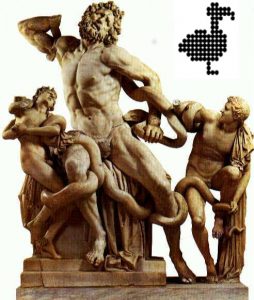 Naar aanleiding van de eurocrisis richt Cultuurpers zich in een reeks artikelen op Griekenland. In het eerste deel kijkt George Vermij hoe film ons beeld van het mediterrane land heeft beïnvloed.
Naar aanleiding van de eurocrisis richt Cultuurpers zich in een reeks artikelen op Griekenland. In het eerste deel kijkt George Vermij hoe film ons beeld van het mediterrane land heeft beïnvloed.
Is er niet een treffender beeld van Griekenland dan Antony Quinn als Zorba die de Sirtaki danst en berusting vindt ondanks de harde tegenslagen die het leven biedt? Het succes van Zorba the Greek (1964) was het begin van een cultureel cliché dat het beeld van het land voor velen voorgoed heeft bepaald. Zie de recente cover van Der Spiegel bijvoorbeeld waar de beroemde scène wordt geparodieerd.
In de film staat Zorba voor het leven van dag tot dag. Hij is een levensgenieter die het licht neemt met verantwoordelijkheden en in de film gecontrasteerd wordt met een nuchter personage gespeeld door Alan Bates. De film van de Cyprioot Michael Cacoyannis speelt zich af op Kreta dat verouderd aandoet met zijn archaïsche gewoonten en armoede. Dit is niet het verlichte Europa, maar een plek waar de tijd stil heeft gestaan.
Het personage van Zorba toont Quinns ambigue relatie met Griekenland. Hij was een Amerikaan met Mexicaanse roots, maar dat belette hem niet om een Griekse verzetsstrijder te spelen in The Guns of Navarone (1961). In de boekverfilming van John Fowles The Magus (1968) was hij opnieuw een mysterieuze Griek tegenover de stijve Brit Michael Caine. Als dat al niet genoeg was, werd Quinn ook nog eens gestrikt om de ultieme Griek te spelen in The Greek Tycoon (1978). In die vergeetbare jetsetsoap speelde hij de excentrieke Aristoteles Onassis.
De hoer met het gouden hart
Als vrouwelijke tegenpool voor Quinns stereotiepe Griek is er Melina Merkouri die in Never on Sunday (1960) een vurige prostitué speelt. Een Amerikaanse toerist moet niets hebben van haar vrije geest en losse zeden en probeert haar op te voeden. Het is echter maar de vraag of de hoer met het gouden hart op het rechte pad blijft. Hoe toepasselijk dat een gepassioneerde Griekse bij de les wordt gehouden door het ingrijpen van een rationale buitenlander. Amerikaan Jules Dassin (bekend van Rififi en Topkapi) regisseerde de film en speelde een rol naast Merkouri die ook zijn partner was. De trailer is hilarisch en maakt van het leven van een eenvoudig hoertje wel een erg groot feest.
Op basis van bovenstaande films kan je wel stellen dat Griekenland in de buitenlandse cinema een luilekkerland is waar de moderne beschaving nog niet zijn intrede heeft gedaan. Maar dat gegeven vormt een deel van de charme van de eilanden en ruïnes die blaken onder de mediterrane zon. Het is een beeld dat al gecultiveerd werd in het boek My family and other animals van Gerald Durrell. In het sympathieke autobiografische verhaal beschrijft hij zijn kindertijd in de jaren 30 als hij met zijn familie zit opgescheept op het idyllische Corfu. Het eiland met zijn bijzondere fauna worden liefdevol beschreven als een soort ideale ontsnappingsplek van het gereserveerde Engeland. Het geliefde boek werd twee keer voor de televisie bewerkt en heeft daarmee ongetwijfeld een stempel gedrukt op het imago van het land voor veel Britten.
Charme en dictatuur
Het is die charme die op het eerste gezicht ook overheerst in het Italiaanse Mediterraneo (1991) en het sentimentele Captain Corelli’s Mandolin (2001) die zich afspelen tijdens de Tweede Wereldoorlog. In beide films komen Italiaanse soldaten aan op een Grieks eiland en worden langzaam betoverd door de vrouwen en het relaxte leefritme. Een idylle die uiteindelijk verstoord wordt door oorlogsgeweld.
https://youtu.be/hISp9ZWqx8c
De complexe geschiedenis van het land is maar in beperkte mate behandeld door filmmakers buiten Griekenland. De Amerikaanse film Eleni (1985) laat een schrijver gespeeld door John Malkovich op zoek gaan naar zijn Griekse moeder die tijdens de burgeroorlog is verdwenen. In zijn zoektocht ontdekt hij de nare en complexe kanten van een strijd die vier jaar heeft geduurd, maar erg onderbelicht is gebleven buiten Griekenland.
De harde realiteit van het kolonelsregime werd treffend in beeld gebracht door de Griekse regisseur Costa-Gavras in Z (1969). Costa-Gavras werkte toen in Frankrijk en maakte met een Franse cast, waaronder Yves Montand en Jean-Louis Trintignant, dit scherpe inkijkje in de werking van een repressief en totalitair systeem.
Ideaal vakantieland
Na de overgang naar democratie werd het eigentijdse Griekenland een pittoreske vakantiebestemming met een belofte op seksuele losbandigheid. In het komische Shirley Valentine (1989) ontvlucht de gevatte Pauline Collins de Engelse bekrompenheid en haar traditionele man door lekker van bil te gaan op de Griekse eilanden. Daar komt ze Costas tegen die weer in een traditie staat van een Griek die door een buitenlander wordt vertolkt. In dit geval valt de eer ten deel aan de grappige Brit Tom Conti. Voor Shirley is Griekenland de ideale plek om jezelf te ontdekken, onder de zon en met een cocktail.
En zie daar de romantische komedies Mamma Mia! (2008) en My Life in Ruins (2009) waar Griekenland vooral wordt beleefd door de ogen van toeristen. Iets dieper gaat het eraan toe in Richard Linklaters Before Midnight (2013), maar de focus ligt vooral op de huwelijksproblemen van Jesse en Celine die Linklater al in zijn eerdere films aandachtig heeft gevolgd.
Het beeld van Zorba en de Griekse geest lijkt moeilijk te onderdrukken. Een stereotype dat is geëxporteerd naar de nieuwe wereld. De populaire komedie My big fat Greek wedding (2002) speelt zich niet af in Griekenland, maar in een winderig Chicago. Ondanks de geografische afstand hebben alle clichés de oversteek naar het Amerikaanse vasteland overleefd inclusief Zorba’s dans. En dan is er de grote dikke bruiloft als symbool voor overdaad en een groot huwelijksfeest waar niet over de kosten wordt nagedacht.

